LWA90010 - 6: Export & International Trade Law CIF Contract Analysis
VerifiedAdded on 2021/07/05
|16
|6278
|149
Report
AI Summary
This report provides a comprehensive analysis of CIF (Cost, Insurance, and Freight) contracts within the framework of international trade law. It begins by outlining the evolution of trade, highlighting the role of organizations like the International Chamber of Commerce (ICC) and the significance of INCOTERMS 2010. The report also references relevant international instruments such as the Hague Rules, Hague-Visby Rules, Hamburg Rules, and Rotterdam Rules, along with key UK statutes like the Carriage of Goods by Sea Acts and the Bills of Lading Act. The Sale of Goods Act 1979 and the Sale and Supply of Goods Act 1994 are presented as fundamental to international trade law. The core of the report focuses on CIF contracts, detailing the obligations of both sellers and buyers, the importance of documentation, and the legal precedents that govern these contracts, including cases like The Julia and Johnson v Taylor Bros. The report then addresses a specific scenario involving Pabilis Silvera and Organic Food Imports Inc. (OFI), examining issues related to faulty packaging, the role of the Bill of Lading, and the implications of these issues under the relevant laws. It covers the seller's duties, including preparing documents such as the invoice and Bill of Lading, and the buyer's responsibilities. The analysis references relevant legal principles, such as conformity with description under the Sale of Goods Act 1979 and the Sale and Supply of Goods Act 1994, and the significance of the time of shipment. The report concludes by applying these legal principles to the specific facts presented in the scenario and highlights the importance of understanding CIF contract obligations.
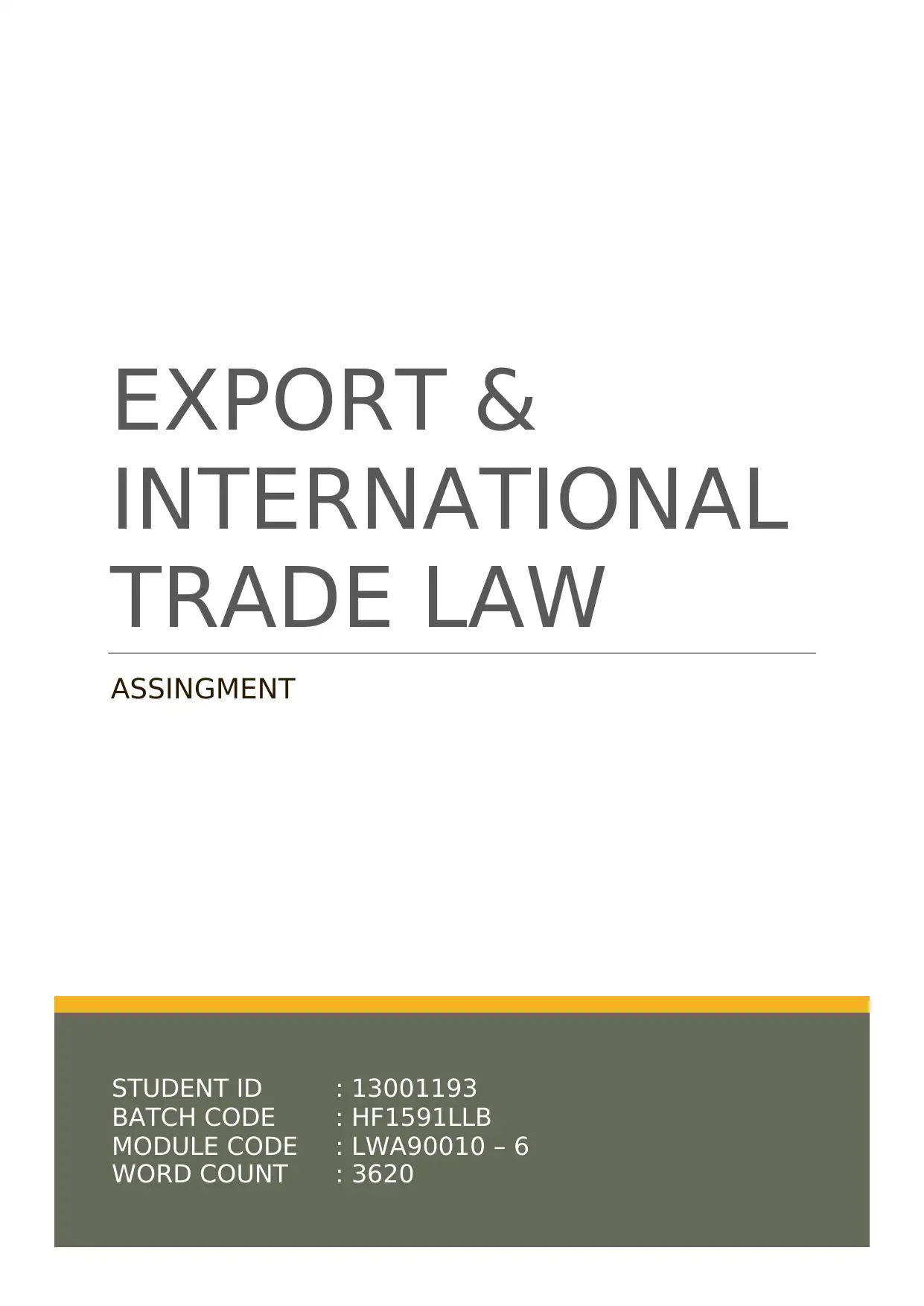
STUDENT ID : 13001193
BATCH CODE : HF1591LLB
MODULE CODE : LWA90010 – 6
WORD COUNT : 3620
EXPORT &
INTERNATIONAL
TRADE LAW
ASSINGMENT
BATCH CODE : HF1591LLB
MODULE CODE : LWA90010 – 6
WORD COUNT : 3620
EXPORT &
INTERNATIONAL
TRADE LAW
ASSINGMENT
Paraphrase This Document
Need a fresh take? Get an instant paraphrase of this document with our AI Paraphraser
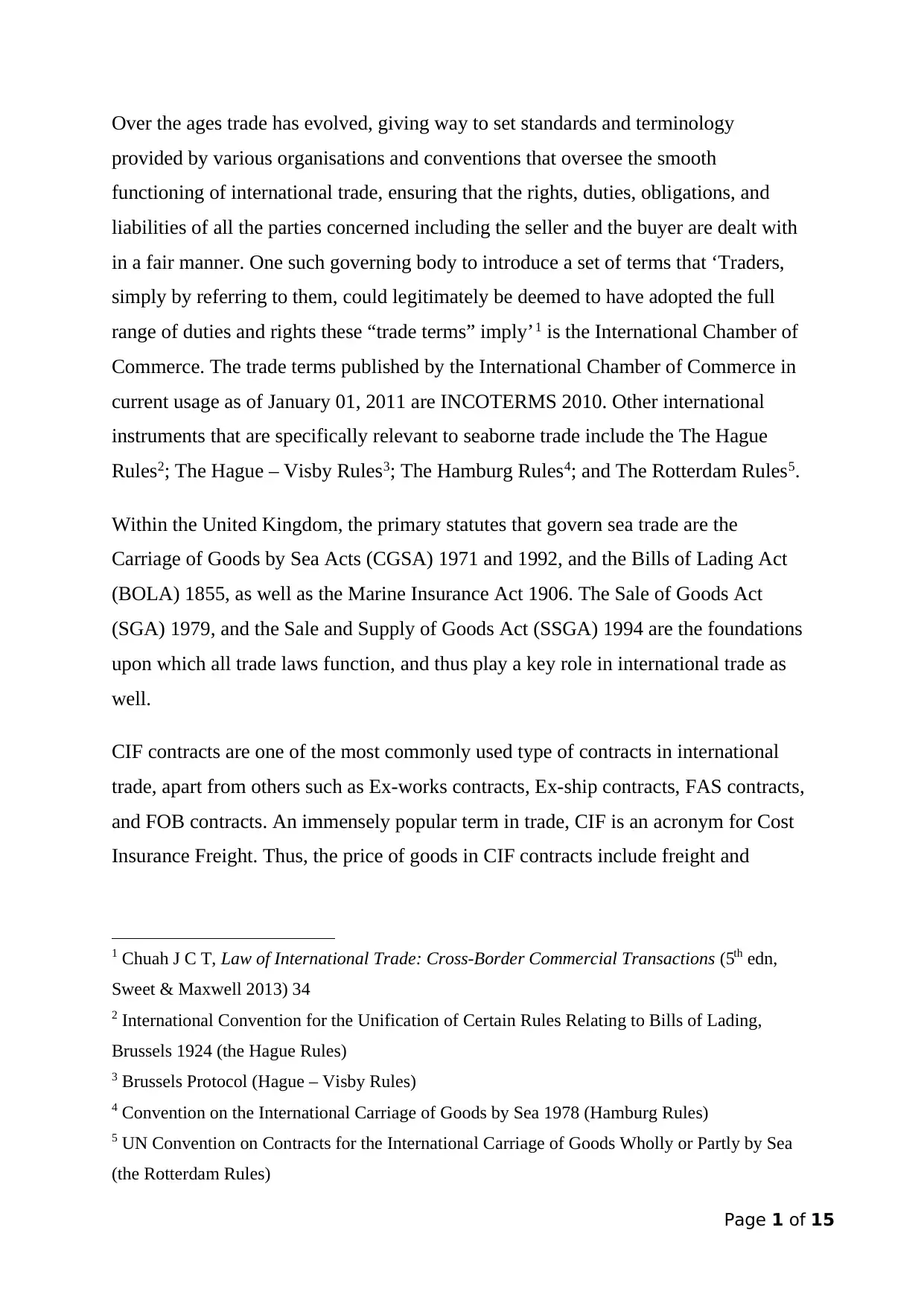
Page 1 of 15
Over the ages trade has evolved, giving way to set standards and terminology
provided by various organisations and conventions that oversee the smooth
functioning of international trade, ensuring that the rights, duties, obligations, and
liabilities of all the parties concerned including the seller and the buyer are dealt with
in a fair manner. One such governing body to introduce a set of terms that ‘Traders,
simply by referring to them, could legitimately be deemed to have adopted the full
range of duties and rights these “trade terms” imply’1 is the International Chamber of
Commerce. The trade terms published by the International Chamber of Commerce in
current usage as of January 01, 2011 are INCOTERMS 2010. Other international
instruments that are specifically relevant to seaborne trade include the The Hague
Rules2; The Hague – Visby Rules3; The Hamburg Rules4; and The Rotterdam Rules5.
Within the United Kingdom, the primary statutes that govern sea trade are the
Carriage of Goods by Sea Acts (CGSA) 1971 and 1992, and the Bills of Lading Act
(BOLA) 1855, as well as the Marine Insurance Act 1906. The Sale of Goods Act
(SGA) 1979, and the Sale and Supply of Goods Act (SSGA) 1994 are the foundations
upon which all trade laws function, and thus play a key role in international trade as
well.
CIF contracts are one of the most commonly used type of contracts in international
trade, apart from others such as Ex-works contracts, Ex-ship contracts, FAS contracts,
and FOB contracts. An immensely popular term in trade, CIF is an acronym for Cost
Insurance Freight. Thus, the price of goods in CIF contracts include freight and
1 Chuah J C T, Law of International Trade: Cross-Border Commercial Transactions (5th edn,
Sweet & Maxwell 2013) 34
2 International Convention for the Unification of Certain Rules Relating to Bills of Lading,
Brussels 1924 (the Hague Rules)
3 Brussels Protocol (Hague – Visby Rules)
4 Convention on the International Carriage of Goods by Sea 1978 (Hamburg Rules)
5 UN Convention on Contracts for the International Carriage of Goods Wholly or Partly by Sea
(the Rotterdam Rules)
Over the ages trade has evolved, giving way to set standards and terminology
provided by various organisations and conventions that oversee the smooth
functioning of international trade, ensuring that the rights, duties, obligations, and
liabilities of all the parties concerned including the seller and the buyer are dealt with
in a fair manner. One such governing body to introduce a set of terms that ‘Traders,
simply by referring to them, could legitimately be deemed to have adopted the full
range of duties and rights these “trade terms” imply’1 is the International Chamber of
Commerce. The trade terms published by the International Chamber of Commerce in
current usage as of January 01, 2011 are INCOTERMS 2010. Other international
instruments that are specifically relevant to seaborne trade include the The Hague
Rules2; The Hague – Visby Rules3; The Hamburg Rules4; and The Rotterdam Rules5.
Within the United Kingdom, the primary statutes that govern sea trade are the
Carriage of Goods by Sea Acts (CGSA) 1971 and 1992, and the Bills of Lading Act
(BOLA) 1855, as well as the Marine Insurance Act 1906. The Sale of Goods Act
(SGA) 1979, and the Sale and Supply of Goods Act (SSGA) 1994 are the foundations
upon which all trade laws function, and thus play a key role in international trade as
well.
CIF contracts are one of the most commonly used type of contracts in international
trade, apart from others such as Ex-works contracts, Ex-ship contracts, FAS contracts,
and FOB contracts. An immensely popular term in trade, CIF is an acronym for Cost
Insurance Freight. Thus, the price of goods in CIF contracts include freight and
1 Chuah J C T, Law of International Trade: Cross-Border Commercial Transactions (5th edn,
Sweet & Maxwell 2013) 34
2 International Convention for the Unification of Certain Rules Relating to Bills of Lading,
Brussels 1924 (the Hague Rules)
3 Brussels Protocol (Hague – Visby Rules)
4 Convention on the International Carriage of Goods by Sea 1978 (Hamburg Rules)
5 UN Convention on Contracts for the International Carriage of Goods Wholly or Partly by Sea
(the Rotterdam Rules)
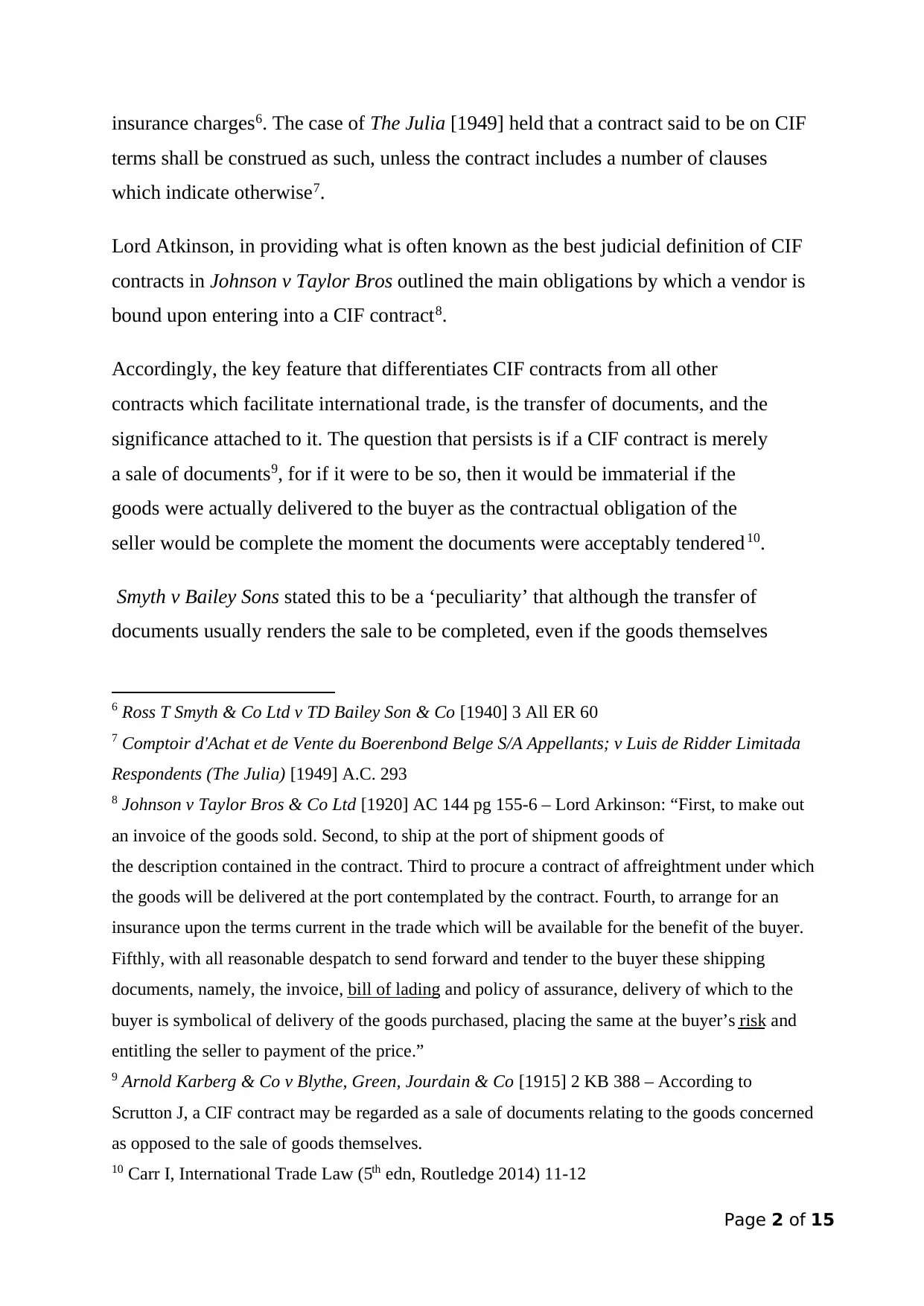
Page 2 of 15
insurance charges6. The case of The Julia [1949] held that a contract said to be on CIF
terms shall be construed as such, unless the contract includes a number of clauses
which indicate otherwise7.
Lord Atkinson, in providing what is often known as the best judicial definition of CIF
contracts in Johnson v Taylor Bros outlined the main obligations by which a vendor is
bound upon entering into a CIF contract8.
Accordingly, the key feature that differentiates CIF contracts from all other
contracts which facilitate international trade, is the transfer of documents, and the
significance attached to it. The question that persists is if a CIF contract is merely
a sale of documents9, for if it were to be so, then it would be immaterial if the
goods were actually delivered to the buyer as the contractual obligation of the
seller would be complete the moment the documents were acceptably tendered10.
Smyth v Bailey Sons stated this to be a ‘peculiarity’ that although the transfer of
documents usually renders the sale to be completed, even if the goods themselves
6 Ross T Smyth & Co Ltd v TD Bailey Son & Co [1940] 3 All ER 60
7 Comptoir d'Achat et de Vente du Boerenbond Belge S/A Appellants; v Luis de Ridder Limitada
Respondents (The Julia) [1949] A.C. 293
8 Johnson v Taylor Bros & Co Ltd [1920] AC 144 pg 155-6 – Lord Arkinson: “First, to make out
an invoice of the goods sold. Second, to ship at the port of shipment goods of
the description contained in the contract. Third to procure a contract of affreightment under which
the goods will be delivered at the port contemplated by the contract. Fourth, to arrange for an
insurance upon the terms current in the trade which will be available for the benefit of the buyer.
Fifthly, with all reasonable despatch to send forward and tender to the buyer these shipping
documents, namely, the invoice, bill of lading and policy of assurance, delivery of which to the
buyer is symbolical of delivery of the goods purchased, placing the same at the buyer’s risk and
entitling the seller to payment of the price.”
9 Arnold Karberg & Co v Blythe, Green, Jourdain & Co [1915] 2 KB 388 – According to
Scrutton J, a CIF contract may be regarded as a sale of documents relating to the goods concerned
as opposed to the sale of goods themselves.
10 Carr I, International Trade Law (5th edn, Routledge 2014) 11-12
insurance charges6. The case of The Julia [1949] held that a contract said to be on CIF
terms shall be construed as such, unless the contract includes a number of clauses
which indicate otherwise7.
Lord Atkinson, in providing what is often known as the best judicial definition of CIF
contracts in Johnson v Taylor Bros outlined the main obligations by which a vendor is
bound upon entering into a CIF contract8.
Accordingly, the key feature that differentiates CIF contracts from all other
contracts which facilitate international trade, is the transfer of documents, and the
significance attached to it. The question that persists is if a CIF contract is merely
a sale of documents9, for if it were to be so, then it would be immaterial if the
goods were actually delivered to the buyer as the contractual obligation of the
seller would be complete the moment the documents were acceptably tendered10.
Smyth v Bailey Sons stated this to be a ‘peculiarity’ that although the transfer of
documents usually renders the sale to be completed, even if the goods themselves
6 Ross T Smyth & Co Ltd v TD Bailey Son & Co [1940] 3 All ER 60
7 Comptoir d'Achat et de Vente du Boerenbond Belge S/A Appellants; v Luis de Ridder Limitada
Respondents (The Julia) [1949] A.C. 293
8 Johnson v Taylor Bros & Co Ltd [1920] AC 144 pg 155-6 – Lord Arkinson: “First, to make out
an invoice of the goods sold. Second, to ship at the port of shipment goods of
the description contained in the contract. Third to procure a contract of affreightment under which
the goods will be delivered at the port contemplated by the contract. Fourth, to arrange for an
insurance upon the terms current in the trade which will be available for the benefit of the buyer.
Fifthly, with all reasonable despatch to send forward and tender to the buyer these shipping
documents, namely, the invoice, bill of lading and policy of assurance, delivery of which to the
buyer is symbolical of delivery of the goods purchased, placing the same at the buyer’s risk and
entitling the seller to payment of the price.”
9 Arnold Karberg & Co v Blythe, Green, Jourdain & Co [1915] 2 KB 388 – According to
Scrutton J, a CIF contract may be regarded as a sale of documents relating to the goods concerned
as opposed to the sale of goods themselves.
10 Carr I, International Trade Law (5th edn, Routledge 2014) 11-12
⊘ This is a preview!⊘
Do you want full access?
Subscribe today to unlock all pages.

Trusted by 1+ million students worldwide
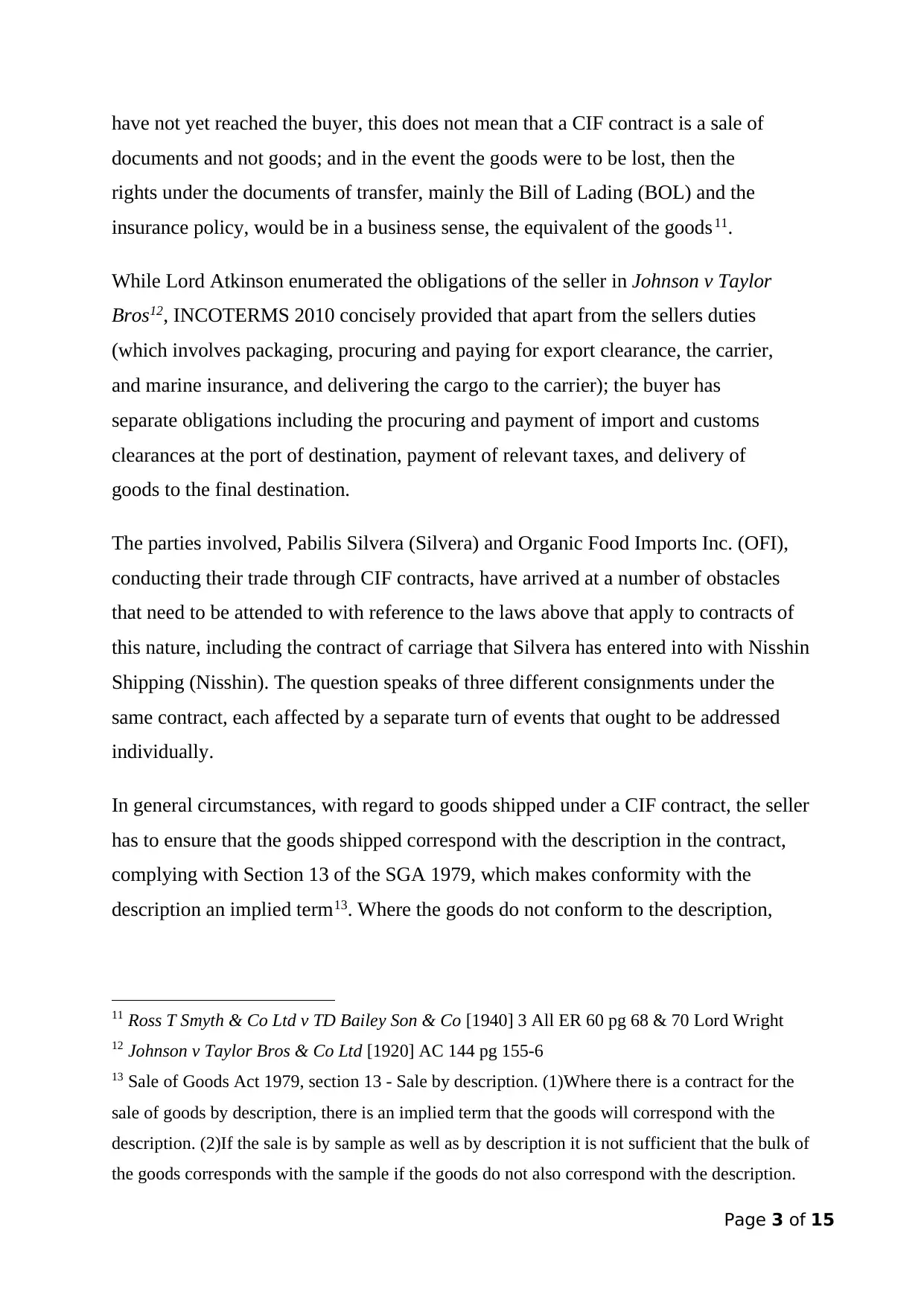
Page 3 of 15
have not yet reached the buyer, this does not mean that a CIF contract is a sale of
documents and not goods; and in the event the goods were to be lost, then the
rights under the documents of transfer, mainly the Bill of Lading (BOL) and the
insurance policy, would be in a business sense, the equivalent of the goods11.
While Lord Atkinson enumerated the obligations of the seller in Johnson v Taylor
Bros12, INCOTERMS 2010 concisely provided that apart from the sellers duties
(which involves packaging, procuring and paying for export clearance, the carrier,
and marine insurance, and delivering the cargo to the carrier); the buyer has
separate obligations including the procuring and payment of import and customs
clearances at the port of destination, payment of relevant taxes, and delivery of
goods to the final destination.
The parties involved, Pabilis Silvera (Silvera) and Organic Food Imports Inc. (OFI),
conducting their trade through CIF contracts, have arrived at a number of obstacles
that need to be attended to with reference to the laws above that apply to contracts of
this nature, including the contract of carriage that Silvera has entered into with Nisshin
Shipping (Nisshin). The question speaks of three different consignments under the
same contract, each affected by a separate turn of events that ought to be addressed
individually.
In general circumstances, with regard to goods shipped under a CIF contract, the seller
has to ensure that the goods shipped correspond with the description in the contract,
complying with Section 13 of the SGA 1979, which makes conformity with the
description an implied term13. Where the goods do not conform to the description,
11 Ross T Smyth & Co Ltd v TD Bailey Son & Co [1940] 3 All ER 60 pg 68 & 70 Lord Wright
12 Johnson v Taylor Bros & Co Ltd [1920] AC 144 pg 155-6
13 Sale of Goods Act 1979, section 13 - Sale by description. (1)Where there is a contract for the
sale of goods by description, there is an implied term that the goods will correspond with the
description. (2)If the sale is by sample as well as by description it is not sufficient that the bulk of
the goods corresponds with the sample if the goods do not also correspond with the description.
have not yet reached the buyer, this does not mean that a CIF contract is a sale of
documents and not goods; and in the event the goods were to be lost, then the
rights under the documents of transfer, mainly the Bill of Lading (BOL) and the
insurance policy, would be in a business sense, the equivalent of the goods11.
While Lord Atkinson enumerated the obligations of the seller in Johnson v Taylor
Bros12, INCOTERMS 2010 concisely provided that apart from the sellers duties
(which involves packaging, procuring and paying for export clearance, the carrier,
and marine insurance, and delivering the cargo to the carrier); the buyer has
separate obligations including the procuring and payment of import and customs
clearances at the port of destination, payment of relevant taxes, and delivery of
goods to the final destination.
The parties involved, Pabilis Silvera (Silvera) and Organic Food Imports Inc. (OFI),
conducting their trade through CIF contracts, have arrived at a number of obstacles
that need to be attended to with reference to the laws above that apply to contracts of
this nature, including the contract of carriage that Silvera has entered into with Nisshin
Shipping (Nisshin). The question speaks of three different consignments under the
same contract, each affected by a separate turn of events that ought to be addressed
individually.
In general circumstances, with regard to goods shipped under a CIF contract, the seller
has to ensure that the goods shipped correspond with the description in the contract,
complying with Section 13 of the SGA 1979, which makes conformity with the
description an implied term13. Where the goods do not conform to the description,
11 Ross T Smyth & Co Ltd v TD Bailey Son & Co [1940] 3 All ER 60 pg 68 & 70 Lord Wright
12 Johnson v Taylor Bros & Co Ltd [1920] AC 144 pg 155-6
13 Sale of Goods Act 1979, section 13 - Sale by description. (1)Where there is a contract for the
sale of goods by description, there is an implied term that the goods will correspond with the
description. (2)If the sale is by sample as well as by description it is not sufficient that the bulk of
the goods corresponds with the sample if the goods do not also correspond with the description.
Paraphrase This Document
Need a fresh take? Get an instant paraphrase of this document with our AI Paraphraser
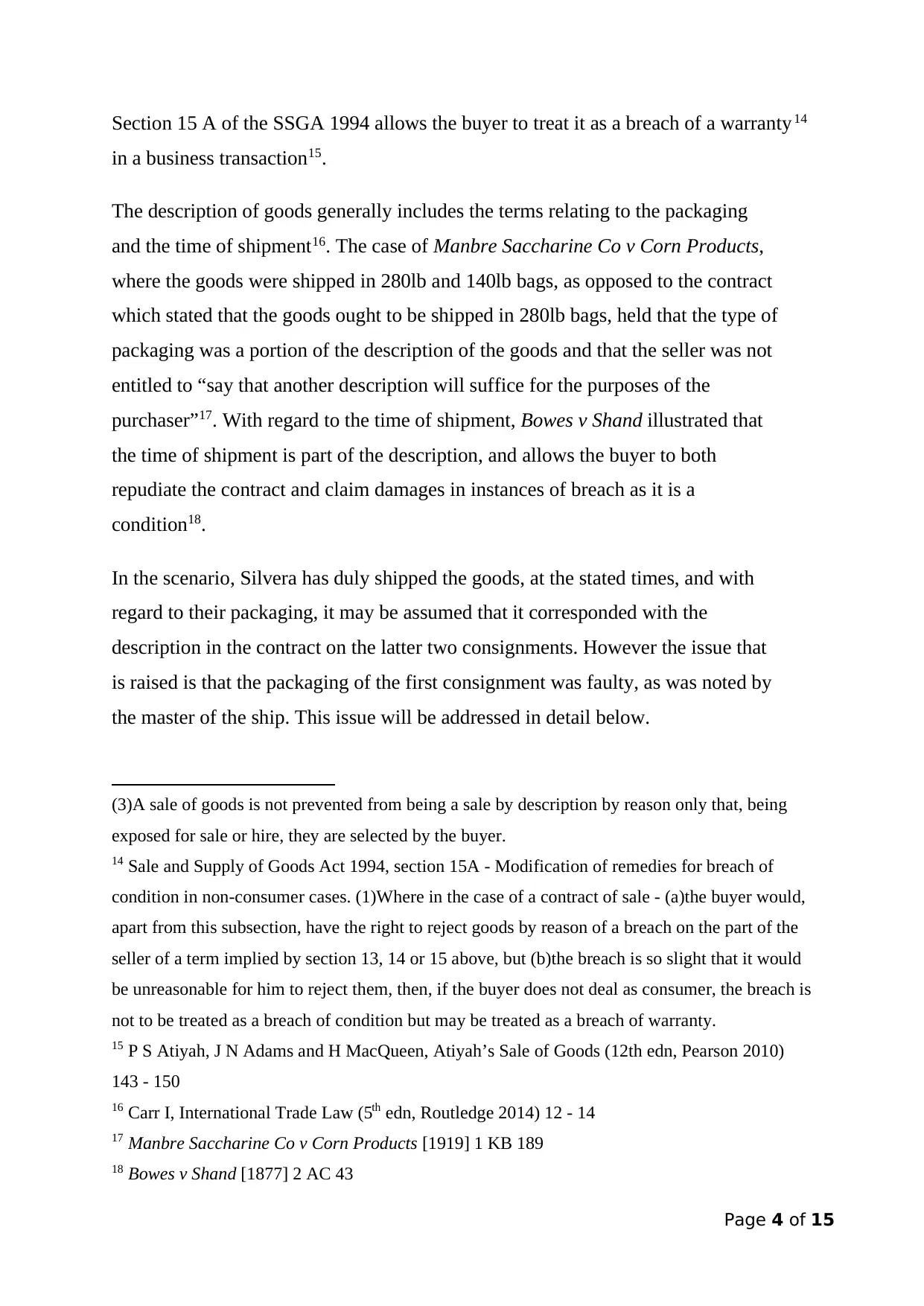
Page 4 of 15
Section 15 A of the SSGA 1994 allows the buyer to treat it as a breach of a warranty 14
in a business transaction15.
The description of goods generally includes the terms relating to the packaging
and the time of shipment16. The case of Manbre Saccharine Co v Corn Products,
where the goods were shipped in 280lb and 140lb bags, as opposed to the contract
which stated that the goods ought to be shipped in 280lb bags, held that the type of
packaging was a portion of the description of the goods and that the seller was not
entitled to “say that another description will suffice for the purposes of the
purchaser”17. With regard to the time of shipment, Bowes v Shand illustrated that
the time of shipment is part of the description, and allows the buyer to both
repudiate the contract and claim damages in instances of breach as it is a
condition18.
In the scenario, Silvera has duly shipped the goods, at the stated times, and with
regard to their packaging, it may be assumed that it corresponded with the
description in the contract on the latter two consignments. However the issue that
is raised is that the packaging of the first consignment was faulty, as was noted by
the master of the ship. This issue will be addressed in detail below.
(3)A sale of goods is not prevented from being a sale by description by reason only that, being
exposed for sale or hire, they are selected by the buyer.
14 Sale and Supply of Goods Act 1994, section 15A - Modification of remedies for breach of
condition in non-consumer cases. (1)Where in the case of a contract of sale - (a)the buyer would,
apart from this subsection, have the right to reject goods by reason of a breach on the part of the
seller of a term implied by section 13, 14 or 15 above, but (b)the breach is so slight that it would
be unreasonable for him to reject them, then, if the buyer does not deal as consumer, the breach is
not to be treated as a breach of condition but may be treated as a breach of warranty.
15 P S Atiyah, J N Adams and H MacQueen, Atiyah’s Sale of Goods (12th edn, Pearson 2010)
143 - 150
16 Carr I, International Trade Law (5th edn, Routledge 2014) 12 - 14
17 Manbre Saccharine Co v Corn Products [1919] 1 KB 189
18 Bowes v Shand [1877] 2 AC 43
Section 15 A of the SSGA 1994 allows the buyer to treat it as a breach of a warranty 14
in a business transaction15.
The description of goods generally includes the terms relating to the packaging
and the time of shipment16. The case of Manbre Saccharine Co v Corn Products,
where the goods were shipped in 280lb and 140lb bags, as opposed to the contract
which stated that the goods ought to be shipped in 280lb bags, held that the type of
packaging was a portion of the description of the goods and that the seller was not
entitled to “say that another description will suffice for the purposes of the
purchaser”17. With regard to the time of shipment, Bowes v Shand illustrated that
the time of shipment is part of the description, and allows the buyer to both
repudiate the contract and claim damages in instances of breach as it is a
condition18.
In the scenario, Silvera has duly shipped the goods, at the stated times, and with
regard to their packaging, it may be assumed that it corresponded with the
description in the contract on the latter two consignments. However the issue that
is raised is that the packaging of the first consignment was faulty, as was noted by
the master of the ship. This issue will be addressed in detail below.
(3)A sale of goods is not prevented from being a sale by description by reason only that, being
exposed for sale or hire, they are selected by the buyer.
14 Sale and Supply of Goods Act 1994, section 15A - Modification of remedies for breach of
condition in non-consumer cases. (1)Where in the case of a contract of sale - (a)the buyer would,
apart from this subsection, have the right to reject goods by reason of a breach on the part of the
seller of a term implied by section 13, 14 or 15 above, but (b)the breach is so slight that it would
be unreasonable for him to reject them, then, if the buyer does not deal as consumer, the breach is
not to be treated as a breach of condition but may be treated as a breach of warranty.
15 P S Atiyah, J N Adams and H MacQueen, Atiyah’s Sale of Goods (12th edn, Pearson 2010)
143 - 150
16 Carr I, International Trade Law (5th edn, Routledge 2014) 12 - 14
17 Manbre Saccharine Co v Corn Products [1919] 1 KB 189
18 Bowes v Shand [1877] 2 AC 43
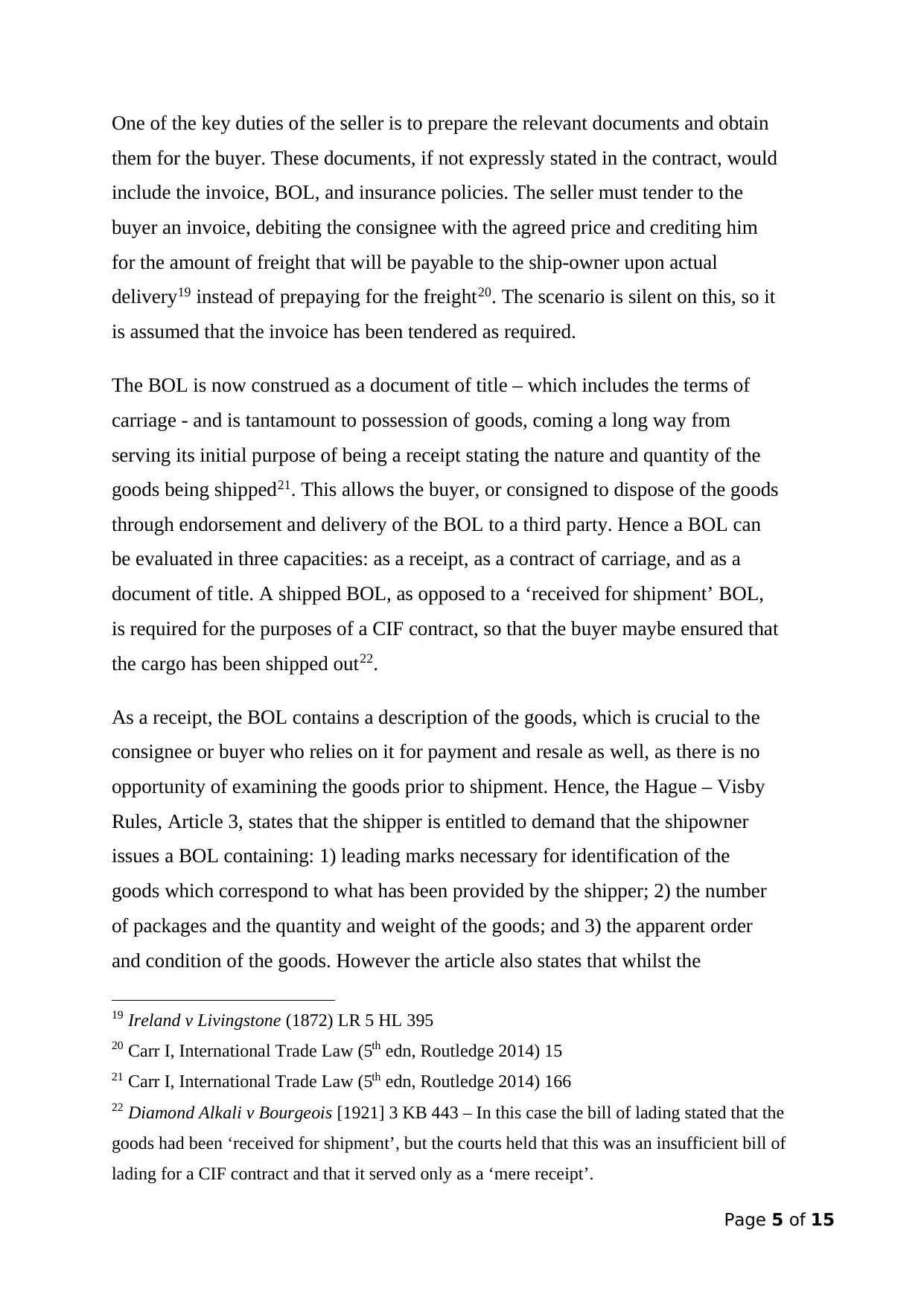
Page 5 of 15
One of the key duties of the seller is to prepare the relevant documents and obtain
them for the buyer. These documents, if not expressly stated in the contract, would
include the invoice, BOL, and insurance policies. The seller must tender to the
buyer an invoice, debiting the consignee with the agreed price and crediting him
for the amount of freight that will be payable to the ship-owner upon actual
delivery19 instead of prepaying for the freight20. The scenario is silent on this, so it
is assumed that the invoice has been tendered as required.
The BOL is now construed as a document of title – which includes the terms of
carriage - and is tantamount to possession of goods, coming a long way from
serving its initial purpose of being a receipt stating the nature and quantity of the
goods being shipped21. This allows the buyer, or consigned to dispose of the goods
through endorsement and delivery of the BOL to a third party. Hence a BOL can
be evaluated in three capacities: as a receipt, as a contract of carriage, and as a
document of title. A shipped BOL, as opposed to a ‘received for shipment’ BOL,
is required for the purposes of a CIF contract, so that the buyer maybe ensured that
the cargo has been shipped out22.
As a receipt, the BOL contains a description of the goods, which is crucial to the
consignee or buyer who relies on it for payment and resale as well, as there is no
opportunity of examining the goods prior to shipment. Hence, the Hague – Visby
Rules, Article 3, states that the shipper is entitled to demand that the shipowner
issues a BOL containing: 1) leading marks necessary for identification of the
goods which correspond to what has been provided by the shipper; 2) the number
of packages and the quantity and weight of the goods; and 3) the apparent order
and condition of the goods. However the article also states that whilst the
19 Ireland v Livingstone (1872) LR 5 HL 395
20 Carr I, International Trade Law (5th edn, Routledge 2014) 15
21 Carr I, International Trade Law (5th edn, Routledge 2014) 166
22 Diamond Alkali v Bourgeois [1921] 3 KB 443 – In this case the bill of lading stated that the
goods had been ‘received for shipment’, but the courts held that this was an insufficient bill of
lading for a CIF contract and that it served only as a ‘mere receipt’.
One of the key duties of the seller is to prepare the relevant documents and obtain
them for the buyer. These documents, if not expressly stated in the contract, would
include the invoice, BOL, and insurance policies. The seller must tender to the
buyer an invoice, debiting the consignee with the agreed price and crediting him
for the amount of freight that will be payable to the ship-owner upon actual
delivery19 instead of prepaying for the freight20. The scenario is silent on this, so it
is assumed that the invoice has been tendered as required.
The BOL is now construed as a document of title – which includes the terms of
carriage - and is tantamount to possession of goods, coming a long way from
serving its initial purpose of being a receipt stating the nature and quantity of the
goods being shipped21. This allows the buyer, or consigned to dispose of the goods
through endorsement and delivery of the BOL to a third party. Hence a BOL can
be evaluated in three capacities: as a receipt, as a contract of carriage, and as a
document of title. A shipped BOL, as opposed to a ‘received for shipment’ BOL,
is required for the purposes of a CIF contract, so that the buyer maybe ensured that
the cargo has been shipped out22.
As a receipt, the BOL contains a description of the goods, which is crucial to the
consignee or buyer who relies on it for payment and resale as well, as there is no
opportunity of examining the goods prior to shipment. Hence, the Hague – Visby
Rules, Article 3, states that the shipper is entitled to demand that the shipowner
issues a BOL containing: 1) leading marks necessary for identification of the
goods which correspond to what has been provided by the shipper; 2) the number
of packages and the quantity and weight of the goods; and 3) the apparent order
and condition of the goods. However the article also states that whilst the
19 Ireland v Livingstone (1872) LR 5 HL 395
20 Carr I, International Trade Law (5th edn, Routledge 2014) 15
21 Carr I, International Trade Law (5th edn, Routledge 2014) 166
22 Diamond Alkali v Bourgeois [1921] 3 KB 443 – In this case the bill of lading stated that the
goods had been ‘received for shipment’, but the courts held that this was an insufficient bill of
lading for a CIF contract and that it served only as a ‘mere receipt’.
⊘ This is a preview!⊘
Do you want full access?
Subscribe today to unlock all pages.

Trusted by 1+ million students worldwide
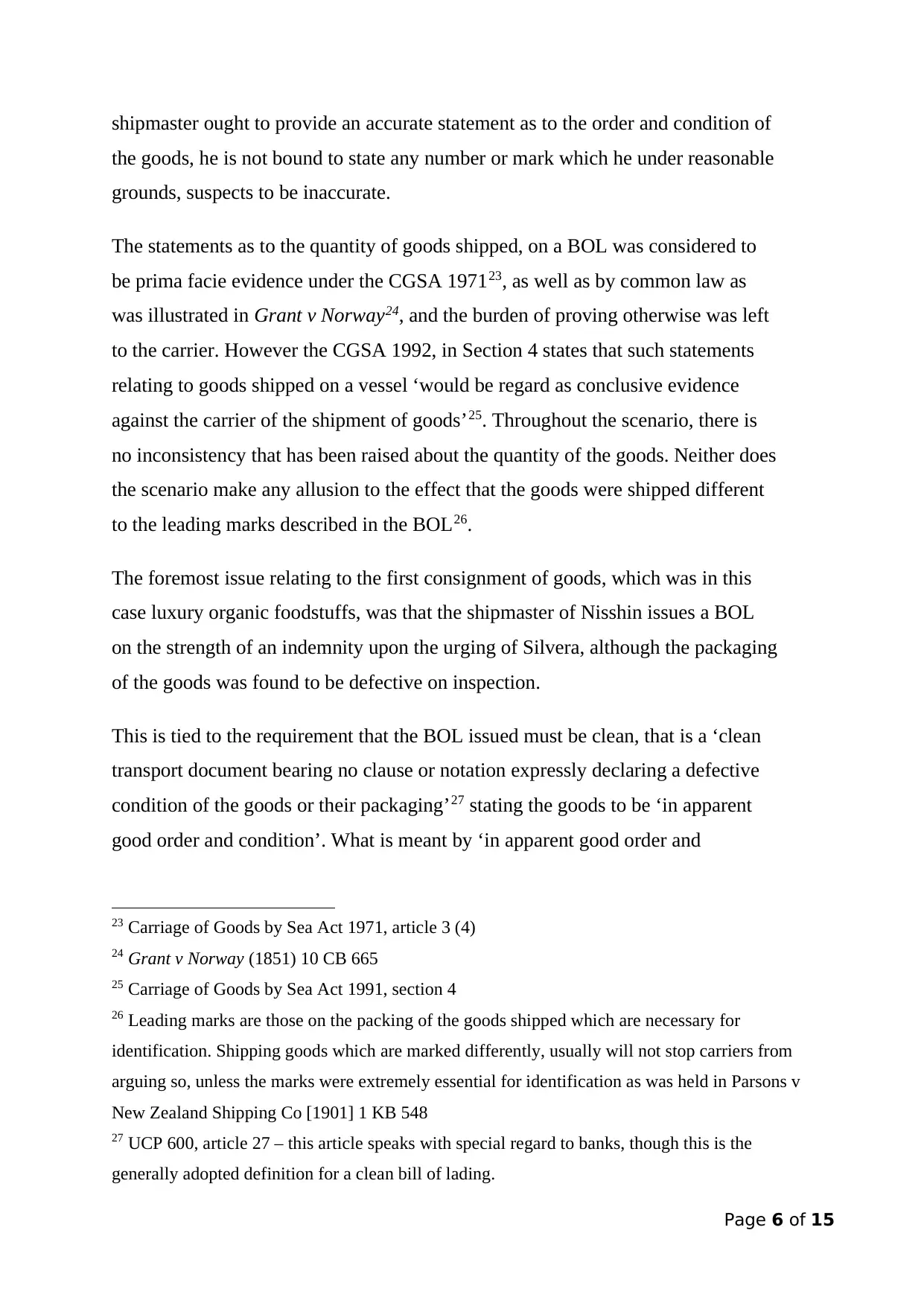
Page 6 of 15
shipmaster ought to provide an accurate statement as to the order and condition of
the goods, he is not bound to state any number or mark which he under reasonable
grounds, suspects to be inaccurate.
The statements as to the quantity of goods shipped, on a BOL was considered to
be prima facie evidence under the CGSA 197123, as well as by common law as
was illustrated in Grant v Norway24, and the burden of proving otherwise was left
to the carrier. However the CGSA 1992, in Section 4 states that such statements
relating to goods shipped on a vessel ‘would be regard as conclusive evidence
against the carrier of the shipment of goods’25. Throughout the scenario, there is
no inconsistency that has been raised about the quantity of the goods. Neither does
the scenario make any allusion to the effect that the goods were shipped different
to the leading marks described in the BOL26.
The foremost issue relating to the first consignment of goods, which was in this
case luxury organic foodstuffs, was that the shipmaster of Nisshin issues a BOL
on the strength of an indemnity upon the urging of Silvera, although the packaging
of the goods was found to be defective on inspection.
This is tied to the requirement that the BOL issued must be clean, that is a ‘clean
transport document bearing no clause or notation expressly declaring a defective
condition of the goods or their packaging’27 stating the goods to be ‘in apparent
good order and condition’. What is meant by ‘in apparent good order and
23 Carriage of Goods by Sea Act 1971, article 3 (4)
24 Grant v Norway (1851) 10 CB 665
25 Carriage of Goods by Sea Act 1991, section 4
26 Leading marks are those on the packing of the goods shipped which are necessary for
identification. Shipping goods which are marked differently, usually will not stop carriers from
arguing so, unless the marks were extremely essential for identification as was held in Parsons v
New Zealand Shipping Co [1901] 1 KB 548
27 UCP 600, article 27 – this article speaks with special regard to banks, though this is the
generally adopted definition for a clean bill of lading.
shipmaster ought to provide an accurate statement as to the order and condition of
the goods, he is not bound to state any number or mark which he under reasonable
grounds, suspects to be inaccurate.
The statements as to the quantity of goods shipped, on a BOL was considered to
be prima facie evidence under the CGSA 197123, as well as by common law as
was illustrated in Grant v Norway24, and the burden of proving otherwise was left
to the carrier. However the CGSA 1992, in Section 4 states that such statements
relating to goods shipped on a vessel ‘would be regard as conclusive evidence
against the carrier of the shipment of goods’25. Throughout the scenario, there is
no inconsistency that has been raised about the quantity of the goods. Neither does
the scenario make any allusion to the effect that the goods were shipped different
to the leading marks described in the BOL26.
The foremost issue relating to the first consignment of goods, which was in this
case luxury organic foodstuffs, was that the shipmaster of Nisshin issues a BOL
on the strength of an indemnity upon the urging of Silvera, although the packaging
of the goods was found to be defective on inspection.
This is tied to the requirement that the BOL issued must be clean, that is a ‘clean
transport document bearing no clause or notation expressly declaring a defective
condition of the goods or their packaging’27 stating the goods to be ‘in apparent
good order and condition’. What is meant by ‘in apparent good order and
23 Carriage of Goods by Sea Act 1971, article 3 (4)
24 Grant v Norway (1851) 10 CB 665
25 Carriage of Goods by Sea Act 1991, section 4
26 Leading marks are those on the packing of the goods shipped which are necessary for
identification. Shipping goods which are marked differently, usually will not stop carriers from
arguing so, unless the marks were extremely essential for identification as was held in Parsons v
New Zealand Shipping Co [1901] 1 KB 548
27 UCP 600, article 27 – this article speaks with special regard to banks, though this is the
generally adopted definition for a clean bill of lading.
Paraphrase This Document
Need a fresh take? Get an instant paraphrase of this document with our AI Paraphraser
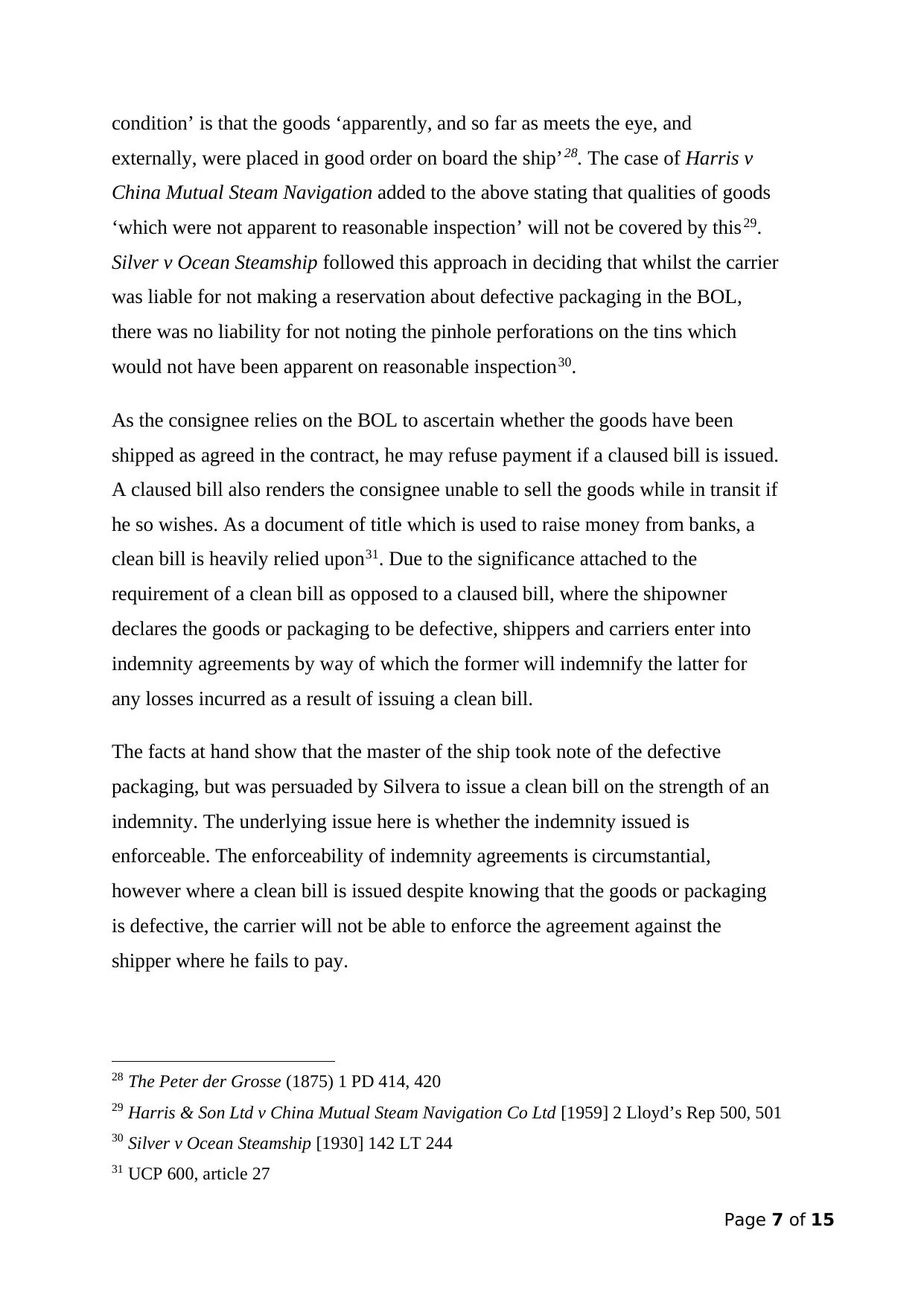
Page 7 of 15
condition’ is that the goods ‘apparently, and so far as meets the eye, and
externally, were placed in good order on board the ship’28. The case of Harris v
China Mutual Steam Navigation added to the above stating that qualities of goods
‘which were not apparent to reasonable inspection’ will not be covered by this29.
Silver v Ocean Steamship followed this approach in deciding that whilst the carrier
was liable for not making a reservation about defective packaging in the BOL,
there was no liability for not noting the pinhole perforations on the tins which
would not have been apparent on reasonable inspection30.
As the consignee relies on the BOL to ascertain whether the goods have been
shipped as agreed in the contract, he may refuse payment if a claused bill is issued.
A claused bill also renders the consignee unable to sell the goods while in transit if
he so wishes. As a document of title which is used to raise money from banks, a
clean bill is heavily relied upon31. Due to the significance attached to the
requirement of a clean bill as opposed to a claused bill, where the shipowner
declares the goods or packaging to be defective, shippers and carriers enter into
indemnity agreements by way of which the former will indemnify the latter for
any losses incurred as a result of issuing a clean bill.
The facts at hand show that the master of the ship took note of the defective
packaging, but was persuaded by Silvera to issue a clean bill on the strength of an
indemnity. The underlying issue here is whether the indemnity issued is
enforceable. The enforceability of indemnity agreements is circumstantial,
however where a clean bill is issued despite knowing that the goods or packaging
is defective, the carrier will not be able to enforce the agreement against the
shipper where he fails to pay.
28 The Peter der Grosse (1875) 1 PD 414, 420
29 Harris & Son Ltd v China Mutual Steam Navigation Co Ltd [1959] 2 Lloyd’s Rep 500, 501
30 Silver v Ocean Steamship [1930] 142 LT 244
31 UCP 600, article 27
condition’ is that the goods ‘apparently, and so far as meets the eye, and
externally, were placed in good order on board the ship’28. The case of Harris v
China Mutual Steam Navigation added to the above stating that qualities of goods
‘which were not apparent to reasonable inspection’ will not be covered by this29.
Silver v Ocean Steamship followed this approach in deciding that whilst the carrier
was liable for not making a reservation about defective packaging in the BOL,
there was no liability for not noting the pinhole perforations on the tins which
would not have been apparent on reasonable inspection30.
As the consignee relies on the BOL to ascertain whether the goods have been
shipped as agreed in the contract, he may refuse payment if a claused bill is issued.
A claused bill also renders the consignee unable to sell the goods while in transit if
he so wishes. As a document of title which is used to raise money from banks, a
clean bill is heavily relied upon31. Due to the significance attached to the
requirement of a clean bill as opposed to a claused bill, where the shipowner
declares the goods or packaging to be defective, shippers and carriers enter into
indemnity agreements by way of which the former will indemnify the latter for
any losses incurred as a result of issuing a clean bill.
The facts at hand show that the master of the ship took note of the defective
packaging, but was persuaded by Silvera to issue a clean bill on the strength of an
indemnity. The underlying issue here is whether the indemnity issued is
enforceable. The enforceability of indemnity agreements is circumstantial,
however where a clean bill is issued despite knowing that the goods or packaging
is defective, the carrier will not be able to enforce the agreement against the
shipper where he fails to pay.
28 The Peter der Grosse (1875) 1 PD 414, 420
29 Harris & Son Ltd v China Mutual Steam Navigation Co Ltd [1959] 2 Lloyd’s Rep 500, 501
30 Silver v Ocean Steamship [1930] 142 LT 244
31 UCP 600, article 27
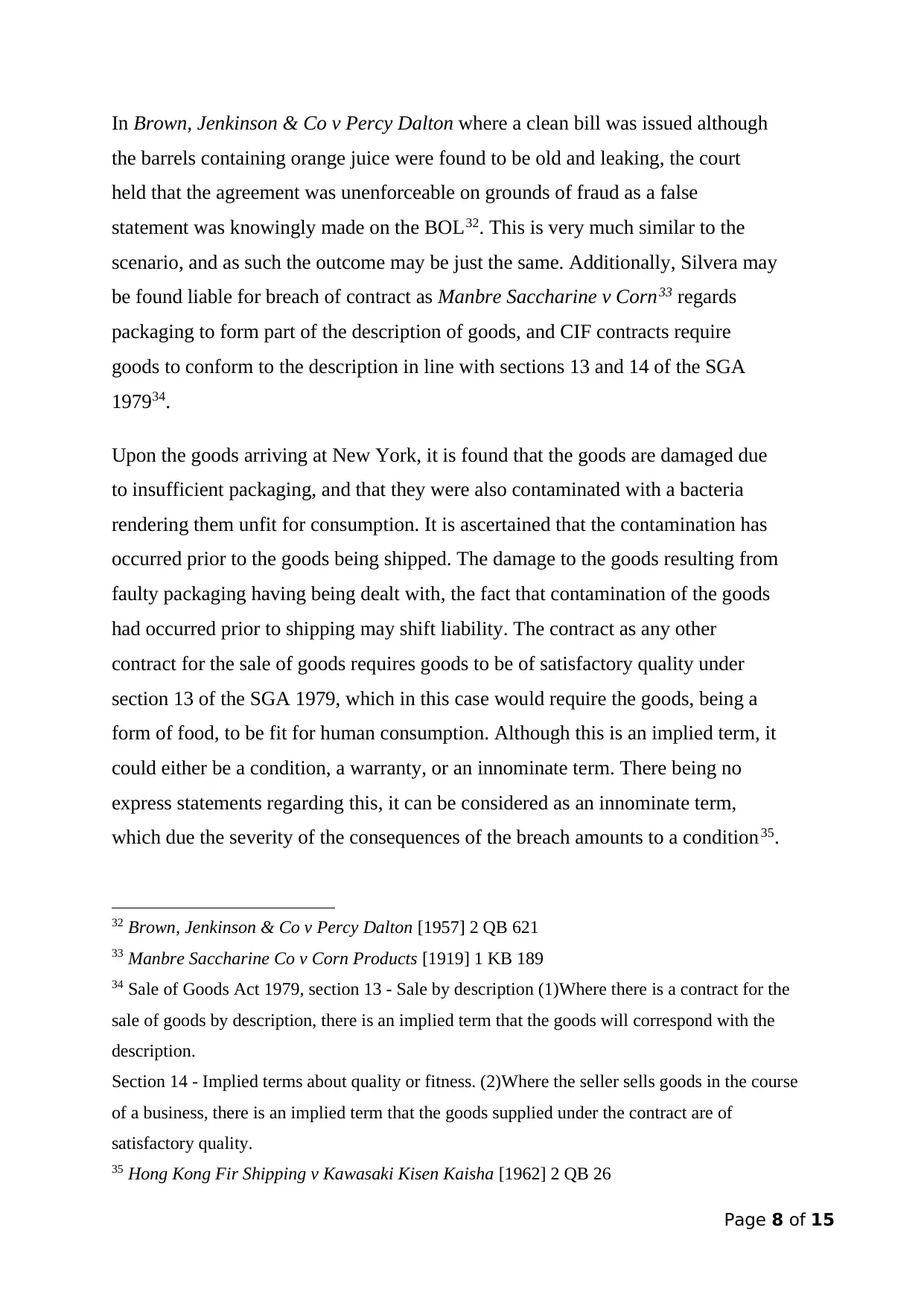
Page 8 of 15
In Brown, Jenkinson & Co v Percy Dalton where a clean bill was issued although
the barrels containing orange juice were found to be old and leaking, the court
held that the agreement was unenforceable on grounds of fraud as a false
statement was knowingly made on the BOL32. This is very much similar to the
scenario, and as such the outcome may be just the same. Additionally, Silvera may
be found liable for breach of contract as Manbre Saccharine v Corn33 regards
packaging to form part of the description of goods, and CIF contracts require
goods to conform to the description in line with sections 13 and 14 of the SGA
197934.
Upon the goods arriving at New York, it is found that the goods are damaged due
to insufficient packaging, and that they were also contaminated with a bacteria
rendering them unfit for consumption. It is ascertained that the contamination has
occurred prior to the goods being shipped. The damage to the goods resulting from
faulty packaging having being dealt with, the fact that contamination of the goods
had occurred prior to shipping may shift liability. The contract as any other
contract for the sale of goods requires goods to be of satisfactory quality under
section 13 of the SGA 1979, which in this case would require the goods, being a
form of food, to be fit for human consumption. Although this is an implied term, it
could either be a condition, a warranty, or an innominate term. There being no
express statements regarding this, it can be considered as an innominate term,
which due the severity of the consequences of the breach amounts to a condition35.
32 Brown, Jenkinson & Co v Percy Dalton [1957] 2 QB 621
33 Manbre Saccharine Co v Corn Products [1919] 1 KB 189
34 Sale of Goods Act 1979, section 13 - Sale by description (1)Where there is a contract for the
sale of goods by description, there is an implied term that the goods will correspond with the
description.
Section 14 - Implied terms about quality or fitness. (2)Where the seller sells goods in the course
of a business, there is an implied term that the goods supplied under the contract are of
satisfactory quality.
35 Hong Kong Fir Shipping v Kawasaki Kisen Kaisha [1962] 2 QB 26
In Brown, Jenkinson & Co v Percy Dalton where a clean bill was issued although
the barrels containing orange juice were found to be old and leaking, the court
held that the agreement was unenforceable on grounds of fraud as a false
statement was knowingly made on the BOL32. This is very much similar to the
scenario, and as such the outcome may be just the same. Additionally, Silvera may
be found liable for breach of contract as Manbre Saccharine v Corn33 regards
packaging to form part of the description of goods, and CIF contracts require
goods to conform to the description in line with sections 13 and 14 of the SGA
197934.
Upon the goods arriving at New York, it is found that the goods are damaged due
to insufficient packaging, and that they were also contaminated with a bacteria
rendering them unfit for consumption. It is ascertained that the contamination has
occurred prior to the goods being shipped. The damage to the goods resulting from
faulty packaging having being dealt with, the fact that contamination of the goods
had occurred prior to shipping may shift liability. The contract as any other
contract for the sale of goods requires goods to be of satisfactory quality under
section 13 of the SGA 1979, which in this case would require the goods, being a
form of food, to be fit for human consumption. Although this is an implied term, it
could either be a condition, a warranty, or an innominate term. There being no
express statements regarding this, it can be considered as an innominate term,
which due the severity of the consequences of the breach amounts to a condition35.
32 Brown, Jenkinson & Co v Percy Dalton [1957] 2 QB 621
33 Manbre Saccharine Co v Corn Products [1919] 1 KB 189
34 Sale of Goods Act 1979, section 13 - Sale by description (1)Where there is a contract for the
sale of goods by description, there is an implied term that the goods will correspond with the
description.
Section 14 - Implied terms about quality or fitness. (2)Where the seller sells goods in the course
of a business, there is an implied term that the goods supplied under the contract are of
satisfactory quality.
35 Hong Kong Fir Shipping v Kawasaki Kisen Kaisha [1962] 2 QB 26
⊘ This is a preview!⊘
Do you want full access?
Subscribe today to unlock all pages.

Trusted by 1+ million students worldwide
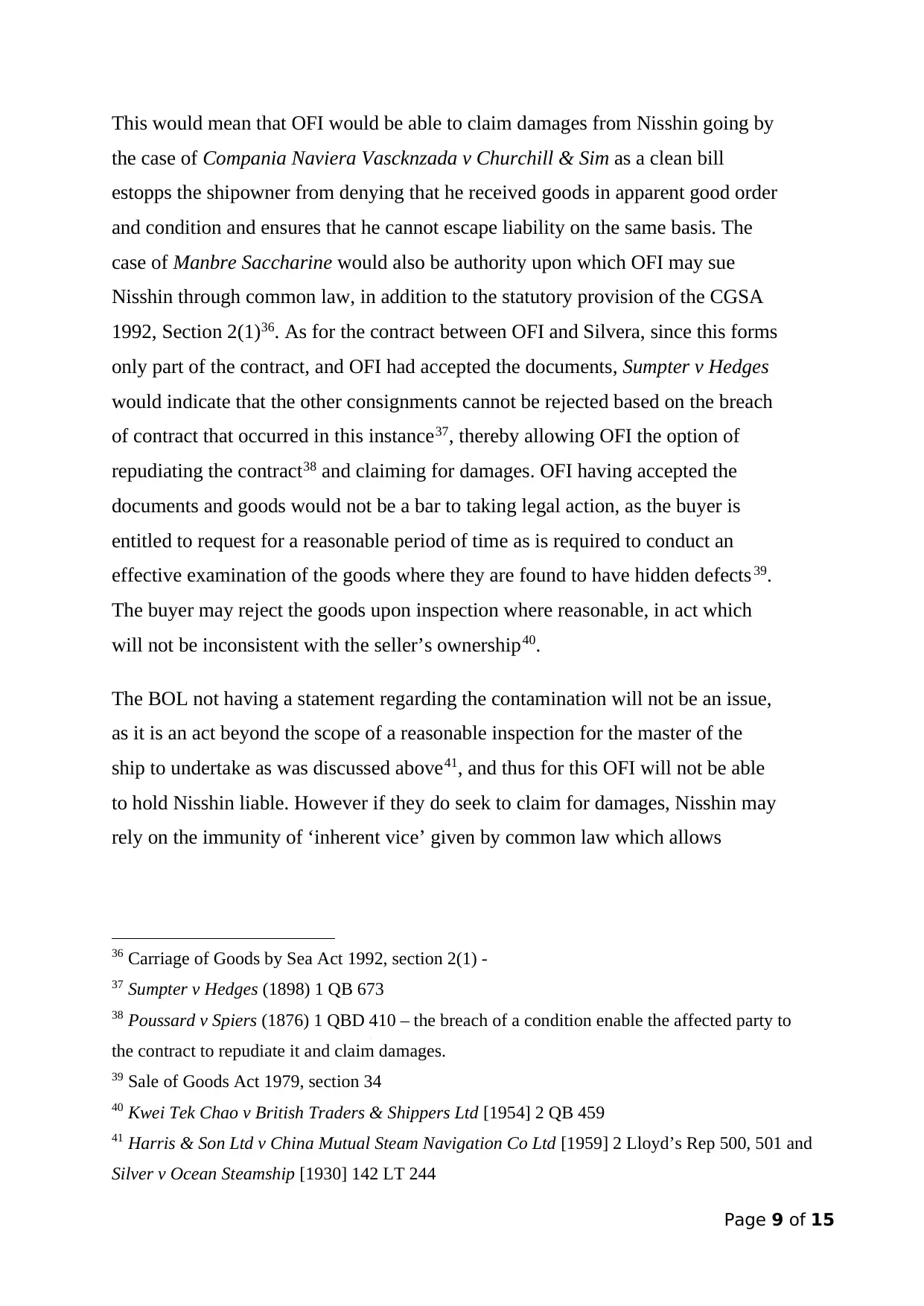
Page 9 of 15
This would mean that OFI would be able to claim damages from Nisshin going by
the case of Compania Naviera Vascknzada v Churchill & Sim as a clean bill
estopps the shipowner from denying that he received goods in apparent good order
and condition and ensures that he cannot escape liability on the same basis. The
case of Manbre Saccharine would also be authority upon which OFI may sue
Nisshin through common law, in addition to the statutory provision of the CGSA
1992, Section 2(1)36. As for the contract between OFI and Silvera, since this forms
only part of the contract, and OFI had accepted the documents, Sumpter v Hedges
would indicate that the other consignments cannot be rejected based on the breach
of contract that occurred in this instance37, thereby allowing OFI the option of
repudiating the contract38 and claiming for damages. OFI having accepted the
documents and goods would not be a bar to taking legal action, as the buyer is
entitled to request for a reasonable period of time as is required to conduct an
effective examination of the goods where they are found to have hidden defects 39.
The buyer may reject the goods upon inspection where reasonable, in act which
will not be inconsistent with the seller’s ownership40.
The BOL not having a statement regarding the contamination will not be an issue,
as it is an act beyond the scope of a reasonable inspection for the master of the
ship to undertake as was discussed above41, and thus for this OFI will not be able
to hold Nisshin liable. However if they do seek to claim for damages, Nisshin may
rely on the immunity of ‘inherent vice’ given by common law which allows
36 Carriage of Goods by Sea Act 1992, section 2(1) -
37 Sumpter v Hedges (1898) 1 QB 673
38 Poussard v Spiers (1876) 1 QBD 410 – the breach of a condition enable the affected party to
the contract to repudiate it and claim damages.
39 Sale of Goods Act 1979, section 34
40 Kwei Tek Chao v British Traders & Shippers Ltd [1954] 2 QB 459
41 Harris & Son Ltd v China Mutual Steam Navigation Co Ltd [1959] 2 Lloyd’s Rep 500, 501 and
Silver v Ocean Steamship [1930] 142 LT 244
This would mean that OFI would be able to claim damages from Nisshin going by
the case of Compania Naviera Vascknzada v Churchill & Sim as a clean bill
estopps the shipowner from denying that he received goods in apparent good order
and condition and ensures that he cannot escape liability on the same basis. The
case of Manbre Saccharine would also be authority upon which OFI may sue
Nisshin through common law, in addition to the statutory provision of the CGSA
1992, Section 2(1)36. As for the contract between OFI and Silvera, since this forms
only part of the contract, and OFI had accepted the documents, Sumpter v Hedges
would indicate that the other consignments cannot be rejected based on the breach
of contract that occurred in this instance37, thereby allowing OFI the option of
repudiating the contract38 and claiming for damages. OFI having accepted the
documents and goods would not be a bar to taking legal action, as the buyer is
entitled to request for a reasonable period of time as is required to conduct an
effective examination of the goods where they are found to have hidden defects 39.
The buyer may reject the goods upon inspection where reasonable, in act which
will not be inconsistent with the seller’s ownership40.
The BOL not having a statement regarding the contamination will not be an issue,
as it is an act beyond the scope of a reasonable inspection for the master of the
ship to undertake as was discussed above41, and thus for this OFI will not be able
to hold Nisshin liable. However if they do seek to claim for damages, Nisshin may
rely on the immunity of ‘inherent vice’ given by common law which allows
36 Carriage of Goods by Sea Act 1992, section 2(1) -
37 Sumpter v Hedges (1898) 1 QB 673
38 Poussard v Spiers (1876) 1 QBD 410 – the breach of a condition enable the affected party to
the contract to repudiate it and claim damages.
39 Sale of Goods Act 1979, section 34
40 Kwei Tek Chao v British Traders & Shippers Ltd [1954] 2 QB 459
41 Harris & Son Ltd v China Mutual Steam Navigation Co Ltd [1959] 2 Lloyd’s Rep 500, 501 and
Silver v Ocean Steamship [1930] 142 LT 244
Paraphrase This Document
Need a fresh take? Get an instant paraphrase of this document with our AI Paraphraser
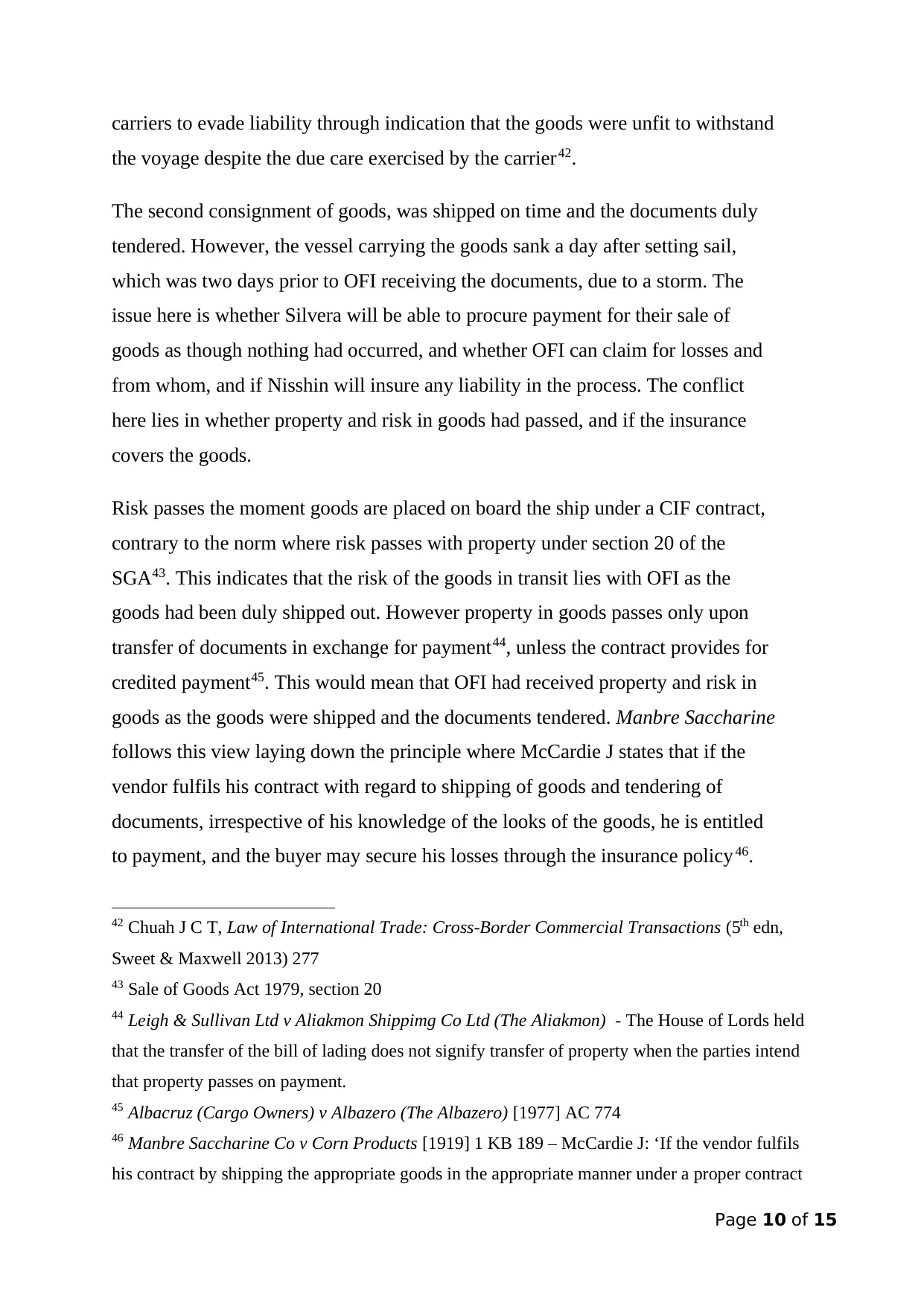
Page 10 of 15
carriers to evade liability through indication that the goods were unfit to withstand
the voyage despite the due care exercised by the carrier42.
The second consignment of goods, was shipped on time and the documents duly
tendered. However, the vessel carrying the goods sank a day after setting sail,
which was two days prior to OFI receiving the documents, due to a storm. The
issue here is whether Silvera will be able to procure payment for their sale of
goods as though nothing had occurred, and whether OFI can claim for losses and
from whom, and if Nisshin will insure any liability in the process. The conflict
here lies in whether property and risk in goods had passed, and if the insurance
covers the goods.
Risk passes the moment goods are placed on board the ship under a CIF contract,
contrary to the norm where risk passes with property under section 20 of the
SGA43. This indicates that the risk of the goods in transit lies with OFI as the
goods had been duly shipped out. However property in goods passes only upon
transfer of documents in exchange for payment44, unless the contract provides for
credited payment45. This would mean that OFI had received property and risk in
goods as the goods were shipped and the documents tendered. Manbre Saccharine
follows this view laying down the principle where McCardie J states that if the
vendor fulfils his contract with regard to shipping of goods and tendering of
documents, irrespective of his knowledge of the looks of the goods, he is entitled
to payment, and the buyer may secure his losses through the insurance policy46.
42 Chuah J C T, Law of International Trade: Cross-Border Commercial Transactions (5th edn,
Sweet & Maxwell 2013) 277
43 Sale of Goods Act 1979, section 20
44 Leigh & Sullivan Ltd v Aliakmon Shippimg Co Ltd (The Aliakmon) - The House of Lords held
that the transfer of the bill of lading does not signify transfer of property when the parties intend
that property passes on payment.
45 Albacruz (Cargo Owners) v Albazero (The Albazero) [1977] AC 774
46 Manbre Saccharine Co v Corn Products [1919] 1 KB 189 – McCardie J: ‘If the vendor fulfils
his contract by shipping the appropriate goods in the appropriate manner under a proper contract
carriers to evade liability through indication that the goods were unfit to withstand
the voyage despite the due care exercised by the carrier42.
The second consignment of goods, was shipped on time and the documents duly
tendered. However, the vessel carrying the goods sank a day after setting sail,
which was two days prior to OFI receiving the documents, due to a storm. The
issue here is whether Silvera will be able to procure payment for their sale of
goods as though nothing had occurred, and whether OFI can claim for losses and
from whom, and if Nisshin will insure any liability in the process. The conflict
here lies in whether property and risk in goods had passed, and if the insurance
covers the goods.
Risk passes the moment goods are placed on board the ship under a CIF contract,
contrary to the norm where risk passes with property under section 20 of the
SGA43. This indicates that the risk of the goods in transit lies with OFI as the
goods had been duly shipped out. However property in goods passes only upon
transfer of documents in exchange for payment44, unless the contract provides for
credited payment45. This would mean that OFI had received property and risk in
goods as the goods were shipped and the documents tendered. Manbre Saccharine
follows this view laying down the principle where McCardie J states that if the
vendor fulfils his contract with regard to shipping of goods and tendering of
documents, irrespective of his knowledge of the looks of the goods, he is entitled
to payment, and the buyer may secure his losses through the insurance policy46.
42 Chuah J C T, Law of International Trade: Cross-Border Commercial Transactions (5th edn,
Sweet & Maxwell 2013) 277
43 Sale of Goods Act 1979, section 20
44 Leigh & Sullivan Ltd v Aliakmon Shippimg Co Ltd (The Aliakmon) - The House of Lords held
that the transfer of the bill of lading does not signify transfer of property when the parties intend
that property passes on payment.
45 Albacruz (Cargo Owners) v Albazero (The Albazero) [1977] AC 774
46 Manbre Saccharine Co v Corn Products [1919] 1 KB 189 – McCardie J: ‘If the vendor fulfils
his contract by shipping the appropriate goods in the appropriate manner under a proper contract
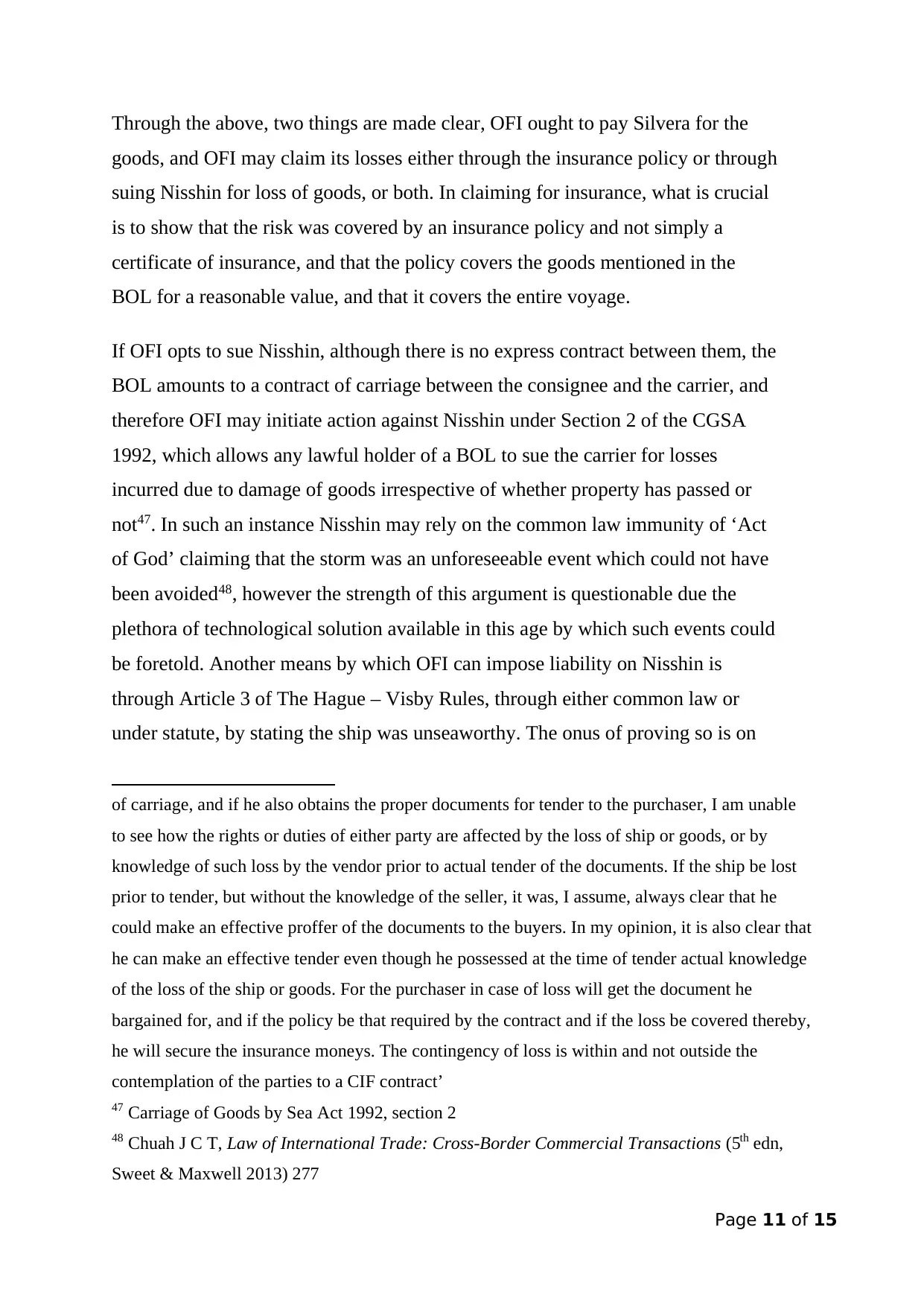
Page 11 of 15
Through the above, two things are made clear, OFI ought to pay Silvera for the
goods, and OFI may claim its losses either through the insurance policy or through
suing Nisshin for loss of goods, or both. In claiming for insurance, what is crucial
is to show that the risk was covered by an insurance policy and not simply a
certificate of insurance, and that the policy covers the goods mentioned in the
BOL for a reasonable value, and that it covers the entire voyage.
If OFI opts to sue Nisshin, although there is no express contract between them, the
BOL amounts to a contract of carriage between the consignee and the carrier, and
therefore OFI may initiate action against Nisshin under Section 2 of the CGSA
1992, which allows any lawful holder of a BOL to sue the carrier for losses
incurred due to damage of goods irrespective of whether property has passed or
not47. In such an instance Nisshin may rely on the common law immunity of ‘Act
of God’ claiming that the storm was an unforeseeable event which could not have
been avoided48, however the strength of this argument is questionable due the
plethora of technological solution available in this age by which such events could
be foretold. Another means by which OFI can impose liability on Nisshin is
through Article 3 of The Hague – Visby Rules, through either common law or
under statute, by stating the ship was unseaworthy. The onus of proving so is on
of carriage, and if he also obtains the proper documents for tender to the purchaser, I am unable
to see how the rights or duties of either party are affected by the loss of ship or goods, or by
knowledge of such loss by the vendor prior to actual tender of the documents. If the ship be lost
prior to tender, but without the knowledge of the seller, it was, I assume, always clear that he
could make an effective proffer of the documents to the buyers. In my opinion, it is also clear that
he can make an effective tender even though he possessed at the time of tender actual knowledge
of the loss of the ship or goods. For the purchaser in case of loss will get the document he
bargained for, and if the policy be that required by the contract and if the loss be covered thereby,
he will secure the insurance moneys. The contingency of loss is within and not outside the
contemplation of the parties to a CIF contract’
47 Carriage of Goods by Sea Act 1992, section 2
48 Chuah J C T, Law of International Trade: Cross-Border Commercial Transactions (5th edn,
Sweet & Maxwell 2013) 277
Through the above, two things are made clear, OFI ought to pay Silvera for the
goods, and OFI may claim its losses either through the insurance policy or through
suing Nisshin for loss of goods, or both. In claiming for insurance, what is crucial
is to show that the risk was covered by an insurance policy and not simply a
certificate of insurance, and that the policy covers the goods mentioned in the
BOL for a reasonable value, and that it covers the entire voyage.
If OFI opts to sue Nisshin, although there is no express contract between them, the
BOL amounts to a contract of carriage between the consignee and the carrier, and
therefore OFI may initiate action against Nisshin under Section 2 of the CGSA
1992, which allows any lawful holder of a BOL to sue the carrier for losses
incurred due to damage of goods irrespective of whether property has passed or
not47. In such an instance Nisshin may rely on the common law immunity of ‘Act
of God’ claiming that the storm was an unforeseeable event which could not have
been avoided48, however the strength of this argument is questionable due the
plethora of technological solution available in this age by which such events could
be foretold. Another means by which OFI can impose liability on Nisshin is
through Article 3 of The Hague – Visby Rules, through either common law or
under statute, by stating the ship was unseaworthy. The onus of proving so is on
of carriage, and if he also obtains the proper documents for tender to the purchaser, I am unable
to see how the rights or duties of either party are affected by the loss of ship or goods, or by
knowledge of such loss by the vendor prior to actual tender of the documents. If the ship be lost
prior to tender, but without the knowledge of the seller, it was, I assume, always clear that he
could make an effective proffer of the documents to the buyers. In my opinion, it is also clear that
he can make an effective tender even though he possessed at the time of tender actual knowledge
of the loss of the ship or goods. For the purchaser in case of loss will get the document he
bargained for, and if the policy be that required by the contract and if the loss be covered thereby,
he will secure the insurance moneys. The contingency of loss is within and not outside the
contemplation of the parties to a CIF contract’
47 Carriage of Goods by Sea Act 1992, section 2
48 Chuah J C T, Law of International Trade: Cross-Border Commercial Transactions (5th edn,
Sweet & Maxwell 2013) 277
⊘ This is a preview!⊘
Do you want full access?
Subscribe today to unlock all pages.

Trusted by 1+ million students worldwide
1 out of 16